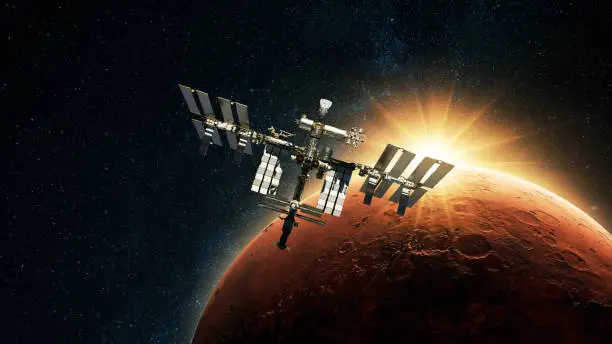Introduction to the Space Race 2.0
You’ve probably heard about the epic push to colonize Mars. SpaceX has made Mars feel like the next logical step. But here’s the big question: what happens after Mars? The space tech landscape is changing faster than ever. We’re looking at a future that’s not just about one planet—but the whole galaxy.
The Shift from Mars to New Frontiers
Mars was just the warm-up. The moon, asteroid belts, even distant moons like Europa or Titan—these are the new targets. We’re not slowing down; we’re revving up.
Who’s Leading the Charge Today?
Elon Musk isn’t alone in this race. We’ve got Jeff Bezos, NASA, the European Space Agency (ESA), China’s CNSA, and startups from all over the world jumping in with bold plans.
Private Companies Fueling the Next Phase
SpaceX and Starship’s Vision Beyond Mars
SpaceX isn’t stopping at Mars. Elon’s long-term plan? Make humans a multi-planetary species. The Starship isn’t just a Mars vehicle—it’s being built for interplanetary (and potentially interstellar) travel.
Blue Origin’s Lunar and Deep Space Ambitions
Jeff Bezos’ Blue Origin is working on building the infrastructure of space. Think of it as creating highways and fuel stations in space.
The Orbital Reef Project
This is a game-changer. Orbital Reef, backed by Blue Origin and Sierra Space, is a proposed space station designed for commercial use—science labs, hotels, manufacturing plants… in orbit!
Emerging Space Startups Worth Watching
From Relativity Space using 3D-printed rockets to Astroscale, which focuses on cleaning up space junk—there’s a whole new generation of companies revolutionizing the space game.
Space Habitats: Living Beyond Mars
Lunar Bases and Moon Villages
The moon is back in style. NASA’s Artemis program is leading efforts to establish a permanent lunar base, and they’re not alone.
ESA’s Moon Village Concept
The European Space Agency envisions a Moon Village, a collaborative effort with multiple nations contributing different pieces of a permanent settlement.
Space Hotels and Commercial Habitats
Companies like Axiom Space are building the first commercial modules for the International Space Station (ISS), with plans to spin off into their own luxury space hotel.
Mining the Cosmos: Asteroids and Beyond
Why Asteroid Mining is Big Business
Did you know a single asteroid can contain trillions of dollars’ worth of metals? We’re talking platinum, gold, and rare earth elements.
Companies Aiming to Tap into Space Resources
Planetary Resources and Deep Space Industries
Both companies are pioneering asteroid mining, with goals to bring back precious materials or use them to fuel deeper missions.
Interstellar Travel: The Ultimate Dream
Technologies Being Tested Right Now
From solar sails to nuclear propulsion, scientists are testing ideas that sound like they came from sci-fi. But they’re real.
The Challenge of Speed and Distance
Even traveling to the nearest star system, Alpha Centauri, would take decades—or centuries—at current speeds. The key is propulsion tech we haven’t perfected… yet.
AI and Robotics in Future Space Exploration
Autonomous Spacecraft and Rovers
AI is critical for managing tasks in far-away missions. NASA’s Perseverance rover is already making decisions on its own.
AI-Powered Navigation and Maintenance
AI helps spacecraft diagnose and fix issues mid-flight, saving millions and reducing risks.
Quantum Communications and Space Internet
Starlink and Global Connectivity
SpaceX’s Starlink is more than fast internet—it’s a framework for global, space-based data transfer, useful for interplanetary missions.
The Future of Quantum Encryption in Space
Secure communication is key. Quantum tech could protect space-based assets from cyberattacks and espionage.
Reusable Rockets and Launch Innovations
The Race for Cheaper Launches
Reusable rockets, like SpaceX’s Falcon 9 and Rocket Lab’s Electron, are cutting launch costs by 10x or more.
Next-Gen Propulsion Systems
Think ion drives, fusion engines, and antimatter propulsion—these are in development, and they might make Mars feel like a neighborhood walk.
Space Tourism 2.0: Beyond the Suborbital Ride
Virgin Galactic’s Next Moves
Richard Branson’s company is taking tourists just past the edge of space—but future plans include longer orbital stays.
SpaceX’s Earth Orbit Cruise Plans
Imagine a trip around Earth in a capsule with giant windows. That’s what SpaceX is planning. Buckle up for space vacations.
Terraforming and Biosphere Technologies
Simulating Earth Ecosystems Off-Planet
We need to figure out how to grow food, recycle air, and produce water in closed environments. Projects like Biosphere 2 are early tests.
Can We Ever Terraform a Planet?
It’s not sci-fi. Terraforming Mars or Venus is still on the theoretical table, though we’re a century or two away from making it happen.
Space Law and Ethics in the New Era
Who Owns What in Space?
The Outer Space Treaty of 1967 says no country owns the Moon or Mars. But what about corporations? It’s still a legal gray area.
Ethical Dilemmas in Colonization
Who gets to live on a new planet? What happens to native microbial life? These are questions we need to answer fast.
Conclusion: The Infinite Horizon of Space Tech
We’ve come a long way since the Moon landing, and Mars is just the start. The next wave of space exploration is about creating a new ecosystem beyond Earth—for work, life, and play. With bold companies, curious minds, and powerful tech, we’re inching closer to becoming a multi-world civilization.
FAQs
1. What’s the next big goal after Mars?
The Moon is a short-term priority, but longer-term goals include asteroid mining, space habitats, and even interstellar probes.
2. Can we really mine asteroids?
Yes! Several companies are working on it, and the technology is becoming more feasible with better propulsion and AI systems.
3. Will humans ever live on another planet permanently?
It’s likely—though it’ll take decades. Moon bases and Mars colonies are being planned, and experiments on Earth are preparing us for this.
4. Who controls space laws?
Space law is currently governed by treaties like the Outer Space Treaty, but enforcement is tricky and mostly symbolic at this stage.
5. What’s the role of AI in space exploration?
AI helps with navigation, autonomous decisions, system diagnostics, and even scientific discoveries on other planets.

